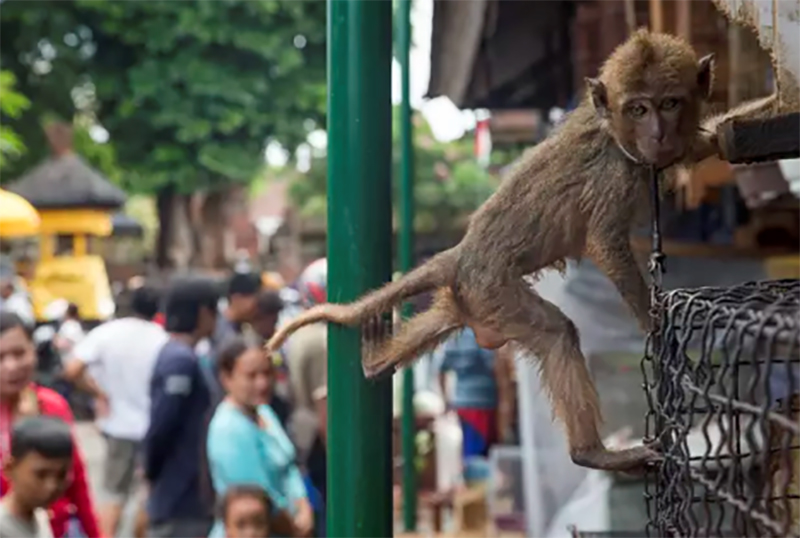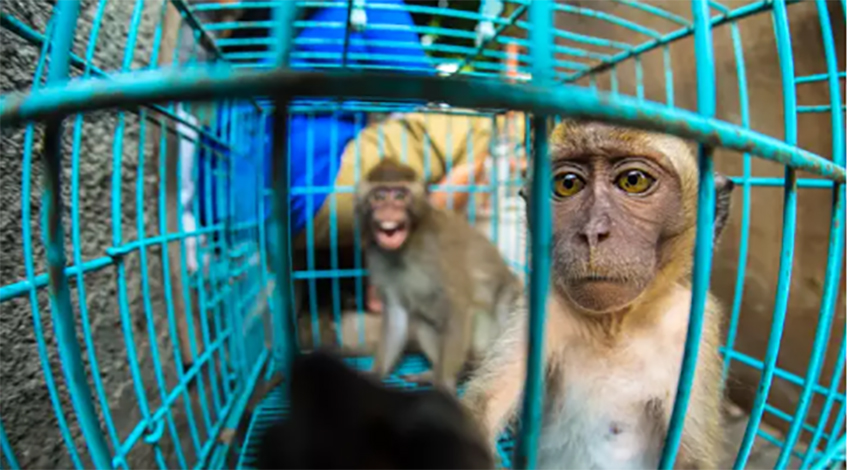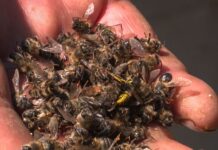Heartbreaking images have been released showing tiny monkeys being sold for $5 at a popular tourist site in Indonesia, adding to the ubiquitous animal cruelty trades.
The photos captured by Luke Massey showed long-tailed macaques living in squalor before being sold to people frequenting the street markets of Bali. The wildlife photographer wrote on his website that the trade remains rampant.
“The illegal wildlife trade is now the second largest global illegal trade, coming only after arms but higher than both people and drug trafficking.”
HELP IMPRISONED PRIMATES. This is the reality of so many #monkeys chained & caged all over #Bali. We have 30 long-tailed macaques now on a waiting list to be removed from captivity. Please don't ever buy monkeys from pet market & #donate to save them https://t.co/Fk6XLGv6Rk pic.twitter.com/Hvis3Z0ojx
— BAWA Bali (@bawa_bali) August 5, 2019
Massey’s images capture a brutal life faced by the small primates in a country where very few trade laws apply. In some images, the animals are locked within tiny cages. In others, they’re forced to perform tricks for tourists.
Massey noted that the tiny monkeys are often rejected after they lose their “cute” appeal and become more aggressive.
“Long-tailed macaques are the most commonly found monkey for sale in Indonesia’s markets.
They are cute looking and easily attainable in the wild relatively close to cities. The demand is mixed.
Some people buy the monkeys as babies, thinking they will stay cute forever, only to find them turn aggressive once they hit adulthood. Others buy them to train as dancing monkeys.”
BE A RESPONSIBLE TOURIST – DON'T SAVE ONE TO SACRIFICE ANOTHER. Often these #monkeys sold at pet markets in #Bali ended up being chained again inside a filthy cage by owners because they're impossible to handle. Learn how to stop this #cruelty: https://t.co/OgngzKaUqu pic.twitter.com/L64Kf21m1e
— BAWA Bali (@bawa_bali) January 4, 2020
Co-founder Femke den Haas of JAAN, the Jakarta Animal Aid Network, said animal cruelty isn’t the only concern here.
“The monkey trade in Indonesia is not controlled and the Forestry Department is not taking action because it’s of less concern to them. But the monkey pet trade should be a huge concern to everybody, not just because of ethical reasons and cruelty, but also because they can enter urban areas and spread diseases.”

Despite the surge in viruses jumping from animals to humans, the routine abuse faced by these monkeys is still a major concern.
“These monkeys are often tortured to learn to stand on their feet like humans, being hung just so their toes touch the ground for hours, beaten and starved so that they ride a bicycle or stilts on demand.
Once trained they are paraded at traffic lights and busy areas, where their owners ask for money after each performance.”
Assisted with the evacuation of two ex pet monkeys at two different locations. Never buy a pet monkey, even out of pity because you will be supporting the trade! More on the story here – https://t.co/1RVZuVkYnh pic.twitter.com/QIO9p9RnLz
— Jakarta Animal Aid (@jaan_indonesia) June 29, 2018
Massey’s sense of helplessness is clear:
“Youngsters are left in small cages or chained up once they reach adulthood. Some lucky monkeys are bought by well-meaning tourists to be released or given to organisations but, despite being well meaning, this usually just fuels the trade.
Seeing a monkey in the wild is a fantastic experience. Seeing them in captivity in the markets is a horrible feeling, seeing their sadness in their eyes, while feeling completely helpless as they’re chained up is awful. Also knowing they are group animals and they are often kept on their own.”






